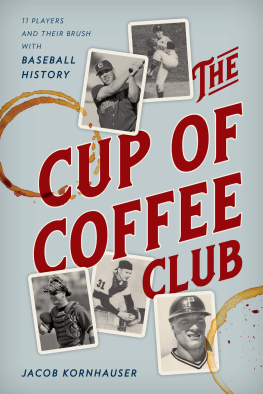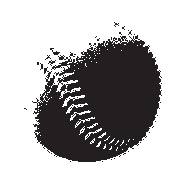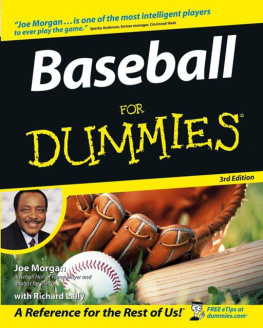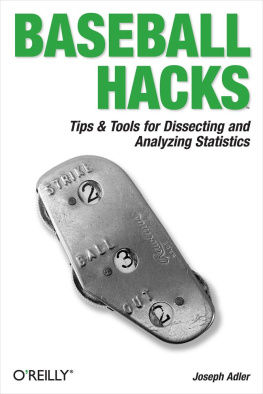THE MENTAL GAME OF BASEBALL
An imprint of Globe Pequot
Trade Division of The Rowman & Littlefield Publishing Group, Inc.
4501 Forbes Boulevard, Suite 200, Lanham, Maryland 20706
Distributed by NATIONAL BOOK NETWORK
800-462-6420
Copyright 2016 Anita Dorfman
All rights reserved. No part of this book may be reproduced in any form or by any electronic or mechanical means, including information storage and retrieval systems, without written permission from the publisher, except by a reviewer who may quote passages in a review.
British Library Cataloguing-in-Publication Information Available
Library of Congress Cataloging-in-Publication Data Available
ISBN 978-1-63076-182-0 (paperback)
ISBN 978-1-63076-183-7 (e-book)
 The paper used in this publication meets the minimum requirements of American National Standard for Information SciencesPermanence of Paper for Printed Library Materials, ANSI/NISO Z39.48-1992.
The paper used in this publication meets the minimum requirements of American National Standard for Information SciencesPermanence of Paper for Printed Library Materials, ANSI/NISO Z39.48-1992.
Printed in the United States of America
To all who tolerated our persistence, and there were many; to all who encouraged it, and there were more; to all who shared with us their knowledge and experience, through the printed word and word of mouth; to all who love this game of baseballand to the vigorous pursuit of excellence, we dedicate this book.
About the Authors
Harvey A. Dorfman was a noted sports psychologist as well as a sports psychology counselor with the Scott Boras Agency. He began his career in baseball psychology with the Oakland Athletics as their full-time instructor and counselor. He later worked with the Florida Marlins and Tampa Bay Devil Rays in a similar capacity before joining the Scott Boras Agency. Recognized as a leading sports psychologist across the world, Dorfman was also a columnist and freelance journalist with articles appearing in The New York Times, The Boston Globe, and The Miami Herald. During his career, he lectured extensively on sports psychology, management and leadership training, and personal development as well as provided counseling services to professional teams in the NHL. He was the author of three other books: Coaching the Mental Game, The Mental ABCs of Pitching, and The Mental Keys to Hitting.
Karl Kuehl was a baseball scout, farm system official, and a coach and manager in Major League Baseball. Throughout his distinguished, thirty-five year career, he worked with teams such as the Montreal Expos, the Minnesota Twins, and the Oakland Athletics. Having served in a variety of capacities, both in the Minor Leagues and the Major Leagues, Kuehl knew first-hand the importance of the mental aspects of the game. He was the co-author of two books: The Mental Game of Baseball and A Champions State of Mind.
The illustrations in The Mental Game of Baseball are by Sharmy Buechner Altschuler, of Cambridge, Massachusetts.
The theory of baseball is as simple as that of any field sport in vogue, and herein lies one of its attractive features; and yet, to play the game up to its highest point of excellence requires as great a degree of mental ability ... as any known game of ball.
From The Game of Baseball
By Henry Chadwick, 1868
For three years he had daydreamed of how he would be a scintillating high-school baseball star and how he would hit a home run with the bases full. And look at the way he had folded up in a pinch. Yes, after kidding himself about his destiny, and having the nerve to think that he would be a star like Ty Cobb or Eddie Collins, he was a miserable failure. Whenever he was in a tight situation, he was a bust, a flat tire. He didnt have what it takes. He was eighteen years old, and he was no good. He lacked somethingnerve, confidence. In a pinch, it was always the same. He lost his confidence. When he didnt have time, a few seconds in which to think, it was different. That was why he was better in football and basketball than he was in baseball. In baseball when you batted, there were those few seconds and fractions of a second between pitches, when your mind undid you. In football and basketball, you didnt have the time to think as you did in baseball. That made the difference. And it was in just that period of a very few important seconds that he was no good. Yes, even though he was considered one of the best athletes in school, he was never really going to be any good.
About the character, Danny ONeill
In Father and Son
By James T. Farrell
Copyright 1940
FOREWORD
In Appreciation of
Harvey Dorfman
By Rick Wolff
W hen Harvey Dorfman passed away in 2011 at the age of 75, major league baseball lost one of its all-time greats.
Over the last 30 years, just about every major league player, general manager, field manager, and agent either knew Harvey or certainly had heard of his impact. They all knew of the mental magic he worked on talented ballplayers.
Harvey was indeed a singular individual, certainly one of a kind.
So ... who was Harvey Dorfman?
In short, he introduced the world of major league baseball to the wonders of sports psychology. And he did it in a most unique and unusual way.
You know the old Yogi Berra expression that half of this game is 90 percent mental? I dont know if Dorfman ever met Yogi, but trust me on this: Harvey certainly agreed with Yogi. Baseball, which is a game based upon constant failure and daily disappointment, is pockmarked by all sorts of mental distractions, obsessions, anxieties, and even superstitions. Harvey knew all of this, inhaled it all, and helped pro players of all stripes come to terms with their fears.
A man of apparent contradictions, Harvey was a most educated and literate gentleman. He was a man of letters, a true scholar. Yet to better communicate with ballplayers, he could swear like a drunken sailor with enough profanity mixed in to peel paint off a wall. Harvey offered no apology for this approach; he just knew that ballplayers would feel more comfortable with him if he spoke the language of dugouts.
But Harvey was indeed a lifelong lover of books. When I first met him and his lovely wife, Anita, at their home in Prescott, Arizona, an entire side of their living room wall was stacked from floor to ceiling with books and more books. Originally trained as a high school English teacher, Dorfman consumed the New York Times Book Review each week in much the same way he would go over the daily baseball box scores.
Back in the 1970s Harvey, Anita, and their two kids resided in Vermont, where Dorfman taught in a small private school and wrote newspaper columns. He was very proud that he coached the schools girls basketball team to great success. But during the summer months Dorfman would attend Vermont Expos minor league games, and it was there that he befriended Karl Kuehl, who oversaw the Expos minor league system.
Over the course of that summer, Kuehl became so impressed with Dorfmans approach to baseball that when Kuehl left the Expos to join the Oakland Athletics, he made sure to hire Harvey as a kind of mental skills coach.
This was a totally new concept. Understand that this was unprecedented in organized baseball. For example, when I was playing in the Detroit Tigers organization in the early 1970s, after having studied psychology as an undergraduate at Harvard, the prevailing attitude in pro baseball was that any player who needs to talk to a shrink needs to have his head examined.










 The paper used in this publication meets the minimum requirements of American National Standard for Information SciencesPermanence of Paper for Printed Library Materials, ANSI/NISO Z39.48-1992.
The paper used in this publication meets the minimum requirements of American National Standard for Information SciencesPermanence of Paper for Printed Library Materials, ANSI/NISO Z39.48-1992.